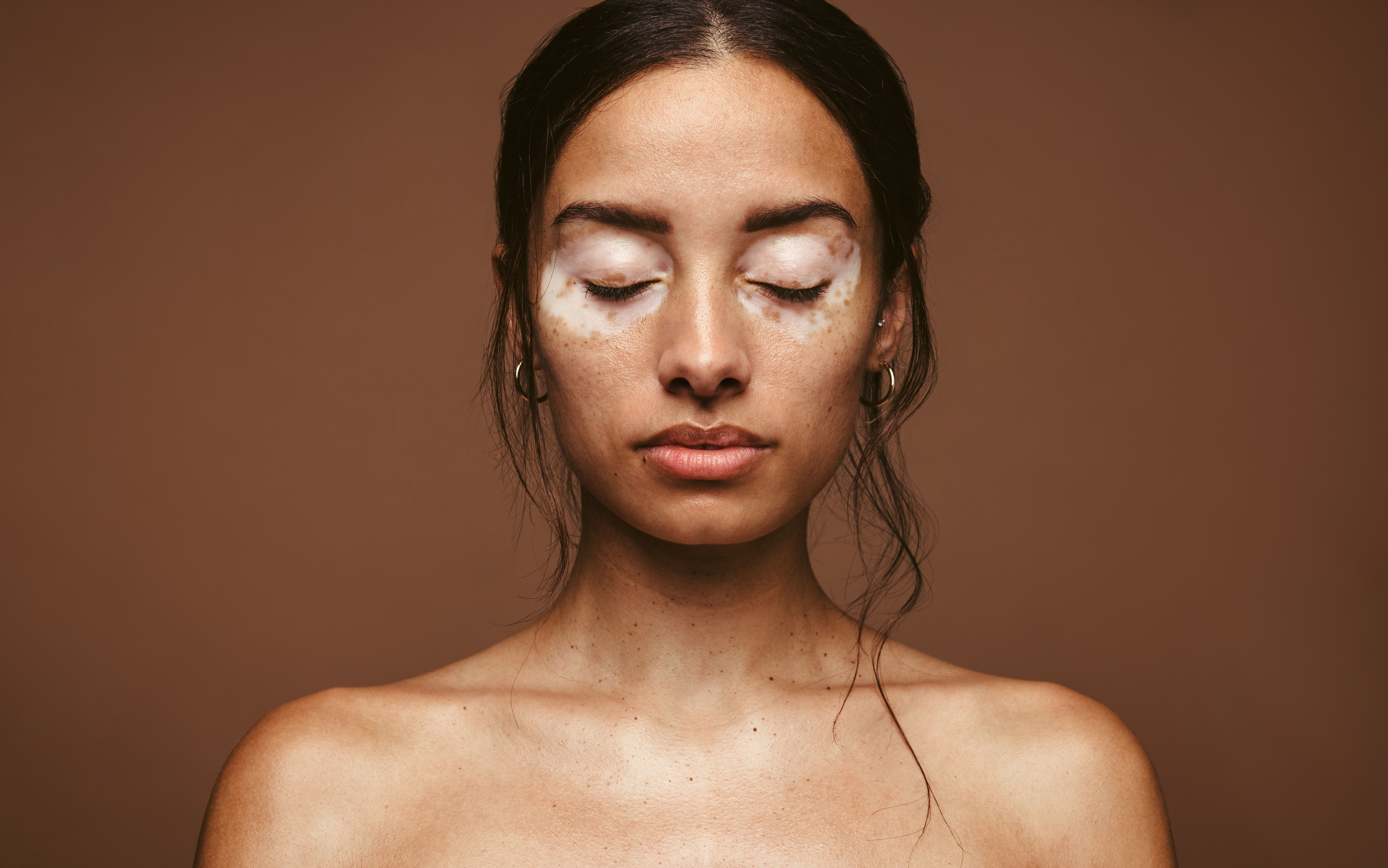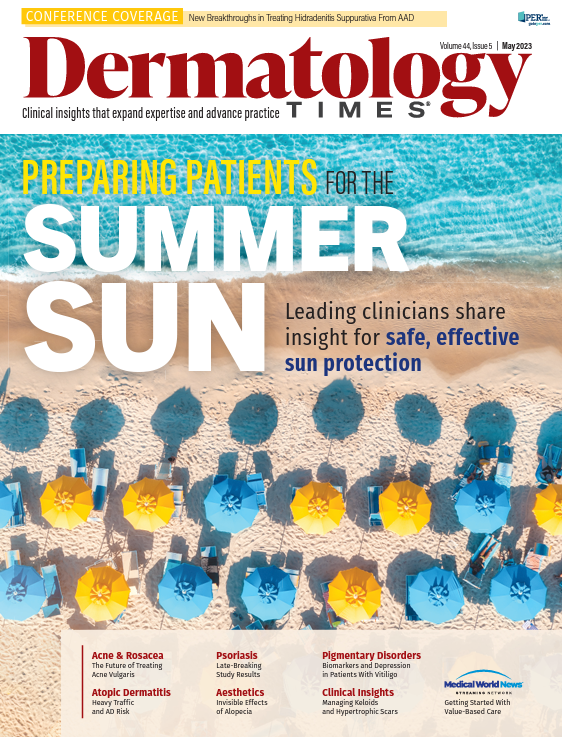- Case-Based Roundtable
- General Dermatology
- Eczema
- Chronic Hand Eczema
- Alopecia
- Aesthetics
- Vitiligo
- COVID-19
- Actinic Keratosis
- Precision Medicine and Biologics
- Rare Disease
- Wound Care
- Rosacea
- Psoriasis
- Psoriatic Arthritis
- Atopic Dermatitis
- Melasma
- NP and PA
- Skin Cancer
- Hidradenitis Suppurativa
- Drug Watch
- Pigmentary Disorders
- Acne
- Pediatric Dermatology
- Practice Management
- Prurigo Nodularis
- Buy-and-Bill
Publication
Article
Dermatology Times
Biomarkers Pivotal in Depression Among Alopecia, Vitiligo Patients
Author(s):
According to new research, vitamin D and serum brain-derived neurotrophic factors may exacerbate depression in some dermatologic patients.
Certain biomarkers such as vitamin D and serum brain-derived neurotrophic factors (BDNF) play a role in the development of depression in patients with vitiligo and alopecia areata.
Jacob Lund/AdobeStock

Vitamin D and serum BDNFs are common biomarkers impacting the development of depression. In patients with alopecia, rates of anxiety and depression are considerably higher than the general population. Prior research also suggests that patients with vitiligo have a higher prevalence of suicidal ideation.
However, in a recent study,1 researchers said the associations between these biomarkers and dermatologic conditions like vitiligo and alopecia are under-researched and lacking, and they sought to correlate them with factors such as quality of life and prevalence.
The study included patients with alopecia (n=30), vitiligo (n=30), and patients deemed (n=30) based on data from blood bank and prior donations. All patients were matched by age and sex. These participants were randomly selected and met Fitzpatrick skin type criteria of II to IV.
Patients with other coexisting dermatologic diseases, a known history of psychological disorders, and use of antidepressants were excluded from participation. Other factors such as pregnancy, lactation, recent phototherapy treatment, and more, were also grounds for exclusion.
Upon participant selection, researchers assessed participants and diagnosed them in accordance with specific alopecia and vitiligo criteria, including dermatologic examination, the Severity of Alopecia Tool (SALT), Alopecia Areata Progression Index, Wood’s light accentuation, Vitiligo Area Severity Index (VASI), and Vitiligo Disease Activity (VIDA) score.
Additionally, all participants underwent psychiatric evaluations and were assessed for psychiatric disorders, including depression. Researchers also examined participants quality of life using the Dermatology Life Quality Index (DLQI) and Children’s Dermatology Life Quality Index.
In order to assess vitamin D and serum BDNF levels, researchers collected a 5 mm blood sample from each participant.
Following the study and data collection, researchers found that participants in the alopecia and vitiligo groups had received, on average, higher scores on the Beck depression inventory scale (BDI). Participants with alopecia had a score of 23.4±6.81, and participants with vitiligo had a score of 22.7 ± 6.65. Participants in the control group received a score of 9.56 ± 2.91.
In the control group, 53.3% of participants did not have depression, and 46.7% had mild depression. Meanwhile, in patients with alopecia, 33.3% had mild depression, 56.7% had moderate depression, and 20% had severe depression. Patients with vitiligo had similar results, with 46.7% having mild depression, 33.3% having moderate depression, and 20% having severe depression.
None of the participants with alopecia and vitiligo fell under the “no depression” category. Similarly, none of the participants in the control group met criteria for moderate nor severe depression.
In regard to DLQI score, in the majority of participants with alopecia or vitiligo, their condition had a severe or extreme effect on their overall quality of life.
In addition to these results, researchers found that levels of vitamin D and serum BDNF were significantly lower in participants with alopecia and vitiligo. In 86.6% of those with alopecia and in 90% of those with vitiligo, vitamin D levels were deemed insufficient or deficient. In participants with vitiligo, these vitamin D levels were even lower.
In participants with alopecia, “Both serum BDNF and serum vitamin D showed significant negative correlations with each of disease duration, SALT score, BDI scale, and DLQI (p = 0.001 for all),” study authors wrote. “Furthermore, serum vitamin D correlated negatively with alopecia activity (AAPI) (p = 0.009).”
In participants with vitiligo, both serum BDNF and vitamin D demonstrated significant VIDA, BDI, and DLQI scores, though neither displayed significant VASI score correlations.
“Among patients, a significant association between degree of depression and both mean serum levels of BDNF and vitamin D has been noted. Both were significantly lower in cases with severe and moderate depression than mild ones,” study authors wrote. “This study may indicate a potential combined effect of serum BDNF and vitamin D on the comorbid depression among AA [alopecia areata] and vitiligo patients. This might support the therapeutic benefits of vitamin D supplementation, since it may raise serum BDNF level and therefore improves depression symptoms.”
Reference
- Dawoud NM, Rajab AZ, El‐Hefnawy SM, El‐Bayoumy AM, Salem AM, Seleit I. Serum brain‐derived neurotrophic factor and vitamin D: two concordant players controlling depression among alopecia areata and vitiligo patients: A case–control study. Journ of Cosmetic Dermatol. 2023. doi:10.1111/jocd.15725







